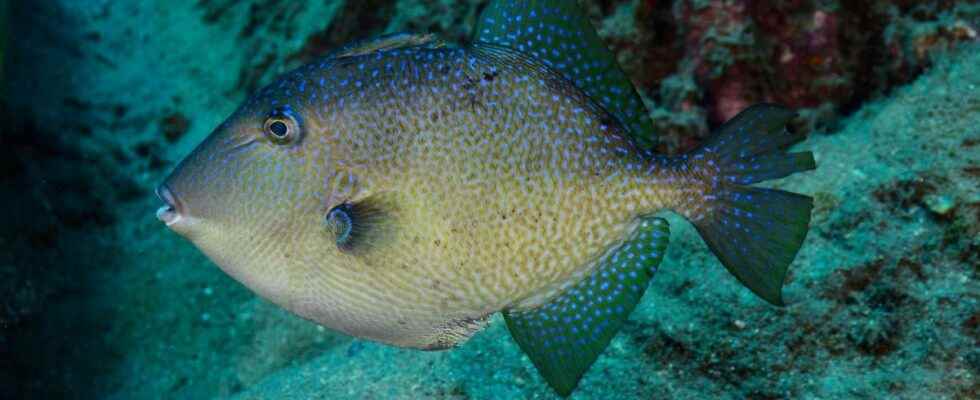Published on
Updated
Reading 2 mins.
in collaboration with
Dr Gérald Kierzek (Medical Director of Doctissimo)
Medical validation:
September 14, 2022
It bites dozens of swimmers every day. The triggerfish, this fish native to the North American coasts, has become the new enemy of the holidays. How to avoid it? And above all, what to do in the event of a bite? Dr. Kierzek’s answers.
For several weeks, the number of bites by the sea has been climbing. In the South West alone, nearly forty bathers have been attacked by this funny fish with sharp teeth, which can measure up to 60 cm and particularly appreciates warm seas.
A curious, territorial and aggressive fish
According to Benjamin Lafon, technician trainer at the Sea Aquarium of Grau-du-Roi (Gard) interviewed by Le Parisien, its appearance in the Atlantic and in the Mediterranean coincides with its reproduction phase; which would partly justify his aggressive attitude.
The rising sea temperature (up to 28°C in the Mediterranean Sea) would also have favored its return to our shores.
The triggerfish would therefore not be fundamentally evil, but it would tenaciously defend its nest.
It is therefore better not to meet him, otherwise you risk being bitten – sometimes several times in a row (his mouth, perfectly equipped, has 14 teeth at the top, 8 teeth at the bottom).
In terms of character, the triggerfish is not used to letting things go.
“It is a curious, territorial and temperamental fish. He is not afraid of humans: if he is disturbed, he attacks, and if he is hunting, he tastes everything, even humans..” thus explains Pascal Romans, oceanological observatory of Banyuls, to France 3.
But how to recognize its bite? It’s simple, if it’s bleeding, it’s a triggerfish bite. It must be differentiated from wounds caused by Sar or Oblade, which bite without drawing blood.
Once out of the water, Dr. Kierzek recommends cleaning the wound thoroughly:
” It must be disinfected, monitored and taken paracetamol if necessary. Aspirin and anti-inflammatories are not recommended because they cause bleeding “, he specifies, before adding ” that if the lesion extends and becomes hot and red, even purulent, a few hours or days later, it is necessary to consult “.
Indeed the risk of superinfection exists. On the other hand, the allergic risk, of the generalized allergic reaction type (breathing difficulties, asthma attack, abdominal pain, malaise, etc.), seems to be rarer.
However, there is no point in taking risks: if you see a triggerfish at the water’s edge, get out immediately and wait for the animal to move away. Ditto in the event of a bite so as not to risk discomfort and drowning!
